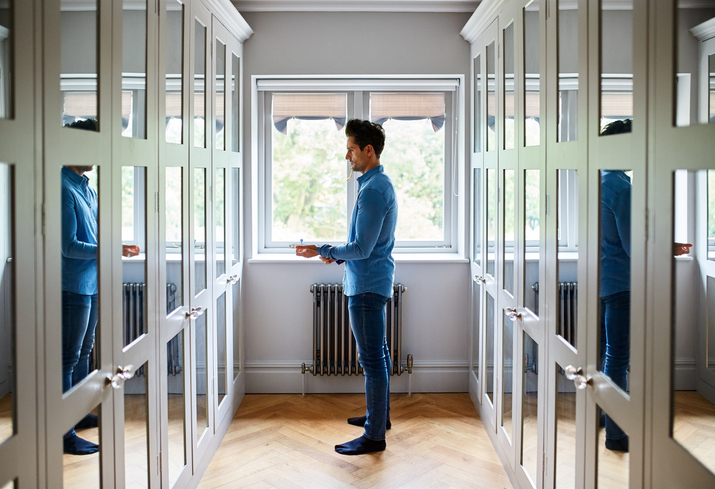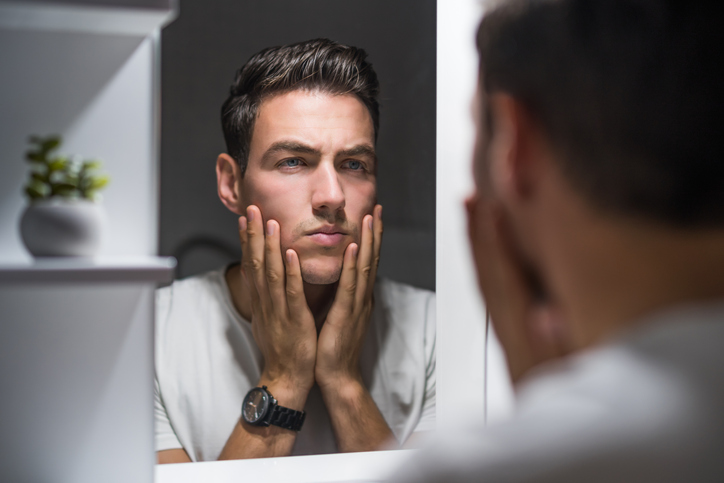We all have moments of self-doubt, and it’s normal to feel down on ourselves sometimes. However, for some people, those negative feelings run deeper, shaping their thoughts, behaviors, and interactions with the world around them. Here are some of the hidden signs that might indicate a struggle with self-love.
1. They constantly apologize for everything.

Ever noticed someone saying “sorry” for things that aren’t even their fault, like apologizing for bumping into someone or for the weather? This constant apologizing might seem polite, but it can be a sign of low self-worth, Psychology Today notes. It’s like they feel like they’re inherently wrong or a burden to people. Remember, there’s a difference between being polite and constantly devaluing yourself.
2. They deflect compliments.

Someone gives them a genuine compliment, and their first instinct is to brush it off or downplay it. They might say things like, “Oh, this old thing?” or “It was nothing, really.” This difficulty accepting praise could stem from a belief that they’re not good enough or worthy of recognition. It’s important to learn to receive compliments graciously and acknowledge your own awesomeness.
3. They’re desperate for constant validation from anyone and everyone.

Whether it’s through social media likes, constant reassurance from loved ones, or looking for external approval for their choices, they seem to crave validation from the people around them. This might be a sign that they don’t trust their own judgment or that their self-worth is dependent on external factors. True confidence comes from within, not from external sources.
4. They compare themselves to everyone else (and always come up short).

It’s natural to compare ourselves to people sometimes, but if you find yourself constantly feeling inferior or measuring your worth against everyone else’s achievements, it can be a sign of low self-esteem. Remember, everyone is on their own journey, and your worth isn’t determined by how you stack up against other people. Focus on your own progress and celebrate your unique strengths and talents.
5. They’re overly critical of themselves.

Do they have a harsh inner critic that constantly berates them for their flaws, mistakes, and perceived shortcomings? This negative self-talk can be incredibly damaging and lead to a spiral of self-doubt. It’s important to practice self-compassion and challenge those negative thoughts. Remember, you’re only human, and everyone makes mistakes.
6. They have a hard time accepting help or support.

People who dislike themselves often feel like they don’t deserve help or that they’re nothing more than a burden. They might refuse offers of help, even when they’re struggling, or feel uncomfortable receiving compliments or praise. It’s important to remember that asking for help is a sign of strength, not weakness, and that you’re worthy of love and support.
7. They self-sabotage their own success or happiness.

This might manifest as procrastination, self-destructive behaviors, or even subconsciously choosing partners who mistreat them. It’s like they don’t believe they deserve happiness or success, so they subconsciously create obstacles to prevent themselves from achieving it. This is a complex issue that often requires professional help to address.
8. They have difficulty setting boundaries.

Saying “no” can be incredibly challenging for people who dislike themselves. They might feel guilty for prioritizing their own needs, worry about disappointing people, or fear rejection. But setting boundaries is non-negotiable for self-respect and healthy relationships. It’s about respecting your own time, energy, and emotional well-being.
9. They are overly defensive.

If someone takes constructive criticism as a personal attack, bristles at even lighthearted teasing, or always feels the need to justify their actions, it might be a sign they’re struggling with their self-worth. They might interpret any feedback as a threat to their fragile ego, leading to defensiveness and an inability to see their own shortcomings.
10. They isolate themselves and avoid social interaction.

Insecurity can lead to social withdrawal and a reluctance to put themselves out there. They might avoid social events, decline invitations, or cancel plans last minute. This isolation can stem from a fear of being judged, criticized, or rejected. While everyone needs some alone time, consistently avoiding social interactions can exacerbate feelings of loneliness and self-doubt.
11. They put people on a pedestal.

As Verywell Mind explains, insecure people often idealize people, seeing them as flawless and perfect. They might compare themselves negatively to these idealized figures, focusing on their own perceived shortcomings. This can lead to feelings of inadequacy and a belief that they’ll never measure up. It’s important to remember that everyone has flaws and that we all have unique strengths and weaknesses.
12. They engage in self-destructive behaviors.

This can manifest in a variety of ways, such as substance abuse, overeating, or self-harm. These behaviors might be a way to numb emotional pain, punish themselves, or cope with feelings of inadequacy. It’s important to recognize these unhealthy patterns and get some professional help if needed.
13. They have difficulty making decisions.

Insecurity can lead to indecisiveness and a fear of making the wrong choice. They might second-guess themselves constantly, rely heavily on other people’s opinions, or even avoid making decisions altogether. This can be paralyzing and prevent them from taking action and moving forward in their lives.
14. They have difficulty accepting compliments.

Even when someone offers genuine praise, they might deflect or downplay it. They might say things like, “Oh, it was nothing,” or “I just got lucky.” This difficulty in accepting compliments stems from a belief that they’re not worthy of praise or that they haven’t truly earned it. It’s important to learn to receive compliments graciously and recognize your own accomplishments.
15. They’re constantly looking for validation through achievements or possessions.

Insecure people might try to boost their self-esteem through external validation, such as achieving a certain career milestone, buying expensive material possessions, or looking for recognition from the people around them. While these things can provide a temporary sense of satisfaction, true self-worth comes from within, not from external sources.
16. They are overly concerned with their reputation or image.

Insecure people often worry excessively about what everyone thinks of them. They might go to great lengths to maintain a certain image, even if it means sacrificing their own happiness or authenticity. This constant need for approval can be exhausting and prevent them from truly being themselves.
17. They have a fear of failure.

This fear can be paralyzing, preventing them from taking risks, trying new things, or pursuing their dreams. They might avoid challenges or opportunities out of fear of not being good enough. This fear of failure can hold them back from reaching their full potential and living a fulfilling life.
Enjoy this piece? Give it a like and follow PsychLove on MSN for more!



